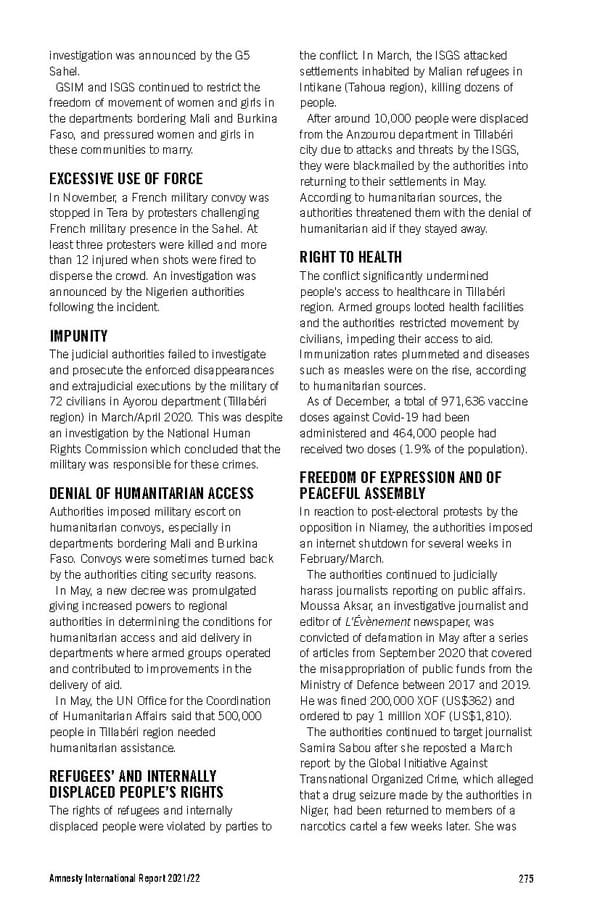investigation was announced by the G5 the conflict. In March, the ISGS attacked Sahel. settlements inhabited by Malian refugees in GSIM and ISGS continued to restrict the Intikane (Tahoua region), killing dozens of freedom of movement of women and girls in people. the departments bordering Mali and Burkina After around 10,000 people were displaced Faso, and pressured women and girls in from the Anzourou department in Tillabéri these communities to marry. city due to attacks and threats by the ISGS, EXCESSIVE USE OF FORCE they were blackmailed by the authorities into returning to their settlements in May. In November, a French military convoy was According to humanitarian sources, the stopped in Tera by protesters challenging authorities threatened them with the denial of French military presence in the Sahel. At humanitarian aid if they stayed away. least three protesters were killed and more RIGHT TO HEALTH than 12 injured when shots were fired to disperse the crowd. An investigation was The conflict significantly undermined announced by the Nigerien authorities people’s access to healthcare in Tillabéri following the incident. region. Armed groups looted health facilities IMPUNITY and the authorities restricted movement by civilians, impeding their access to aid. The judicial authorities failed to investigate Immunization rates plummeted and diseases and prosecute the enforced disappearances such as measles were on the rise, according and extrajudicial executions by the military of to humanitarian sources. 72 civilians in Ayorou department (Tillabéri As of December, a total of 971,636 vaccine region) in March/April 2020. This was despite doses against Covid-19 had been an investigation by the National Human administered and 464,000 people had Rights Commission which concluded that the received two doses (1.9% of the population). military was responsible for these crimes. FREEDOM OF EXPRESSION AND OF DENIAL OF HUMANITARIAN ACCESS PEACEFUL ASSEMBLY Authorities imposed military escort on In reaction to post-electoral protests by the humanitarian convoys, especially in opposition in Niamey, the authorities imposed departments bordering Mali and Burkina an internet shutdown for several weeks in Faso. Convoys were sometimes turned back February/March. by the authorities citing security reasons. The authorities continued to judicially In May, a new decree was promulgated harass journalists reporting on public affairs. giving increased powers to regional Moussa Aksar, an investigative journalist and authorities in determining the conditions for editor of L’Évènement newspaper, was humanitarian access and aid delivery in convicted of defamation in May after a series departments where armed groups operated of articles from September 2020 that covered and contributed to improvements in the the misappropriation of public funds from the delivery of aid. Ministry of Defence between 2017 and 2019. In May, the UN Office for the Coordination He was fined 200,000 XOF (US$362) and of Humanitarian Affairs said that 500,000 ordered to pay 1 million XOF (US$1,810). people in Tillabéri region needed The authorities continued to target journalist humanitarian assistance. Samira Sabou after she reposted a March REFUGEES’ AND INTERNALLY report by the Global Initiative Against Transnational Organized Crime, which alleged DISPLACED PEOPLE’S RIGHTS that a drug seizure made by the authorities in The rights of refugees and internally Niger, had been returned to members of a displaced people were violated by parties to narcotics cartel a few weeks later. She was Amnesty International Report 2021/22 275
 Amnesty International Report 2021/22 Page 274 Page 276
Amnesty International Report 2021/22 Page 274 Page 276